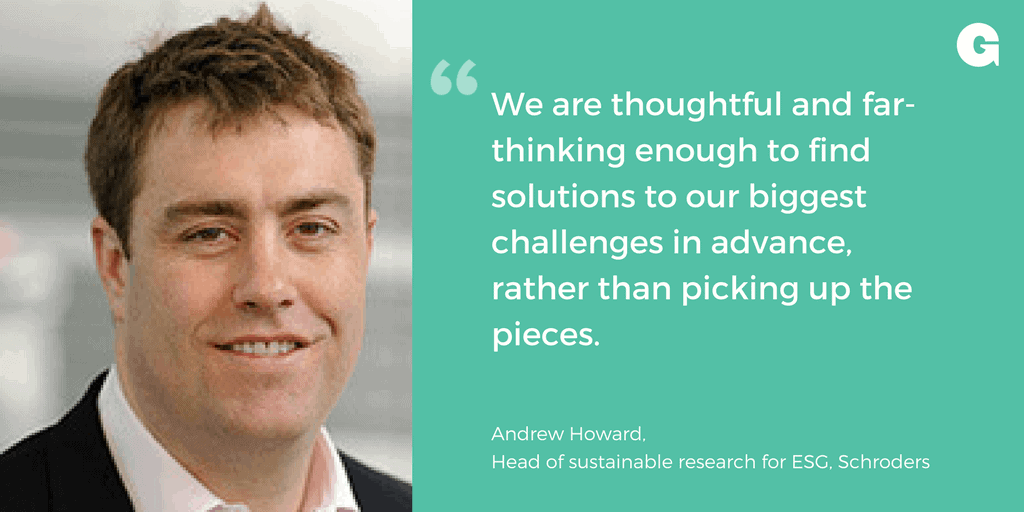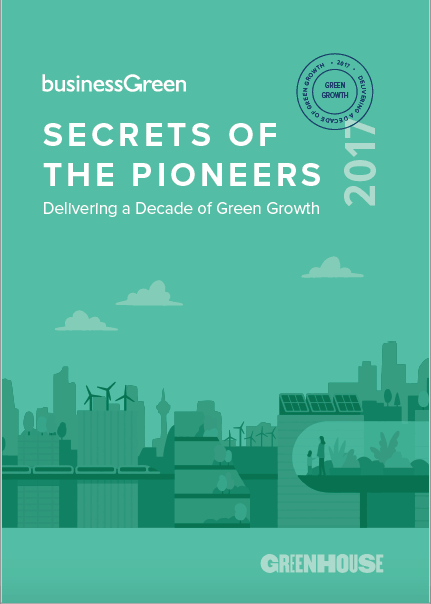Secrets of the Pioneers: Andrew Howard

We speak to Andrew Howard, head of sustainable research for ESG at Schroders.
The interview is part of a series for a report, Secrets of Pioneers, Delivering a Decade of Green Growth, which was launched at the BusinessGreen Leaders’ Summit on 9th November 2017.
Andrew started out as a metals and mining company analyst. He subsequently spent a year at Global Witness where he led the green NGO’s global finance campaign from 2004-2005.
He then worked as a management consultant at McKinsey and Co, before being appointed by Goldman Sachs as head of the research team which helped launch GS SUSTAIN in 2007 – a strategy which sought to incorporate ESG factors into the company’s long-term investment plans. In 2014 he founded his own independent research firm – Didas Research – before joining Schroders in early 2016.
Where were you in 2007?
I was just starting out doing sustainable investment back when it was beginning to become a ‘thing’.
At the time I was at Goldman Sachs starting a product called GS SUSTAIN. It was a time where I would say sustainable investment was beginning to emerge as something which big investors and research firms were trying to work out how to do. So it was on the radar, but was still at a very early stage in terms of figuring out how to approach the question.
How have things transformed over the past decade?
The industry has changed a lot, but – although I hate this phrase – I think we’re on a journey. We’ve moved from being an industry which has historically been a niche part of our investment world, towards a recognition that social and environmental change isn’t simply about ethics and responsibility, it is about understanding businesses better and it’s something which is relevant to all that we do, not just discreet funds.
There is more recognition now that companies are not a set of numbers pulled out of an annual report, they are part of society. Successful companies succeed because they adapt to the social and environmental pressure they are part of, rather than by trying to shape the outcomes. They don’t succeed by running against the grain of social and environmental trends.
What has been the biggest obstacle to green finance over the past decade?
Today we are awash with data, and one of the challenges that creates is it tends to focus people onto a more systematic way of doing investment analysis. What Schroders generally – and personally as well – recognises is that it is very difficult to see where climate change fits into this.
Can we definitively say climate change will have a direct or indirect impact on a company’s earnings over the next 12-18 months, and if so, do we know definitively how big that impact will be in a way we can objectively model? The reality is that no, we don’t.
So while on the one hand I think people understand climate change is going to be an enormously important social, economic, and investment issue over the next five, 10, 20 years, it is much harder for people to know how to incorporate that understanding into day-to-day building of a model and making an investment conclusion.

How have public and corporate attitudes changed towards climate change since 2007?
I think attitudes have changed massively. At a high level, this used to be something that was a bit optional and unusual, and today it is pretty much second nature. Not in every country and age group, but it is becoming that.
Ten years ago there were still questions about whether climate change was definitely happening. If you look at now, that debate has largely passed – one or two very notable people aside.
So I think there has been a real sea-change in how people think about the question. It has shifted from niche to mainstream, from something that some people think about, to something people almost don’t think about, because it has become second nature.
What have been your biggest personal and professional achievements of the past decade?
Well, I think my wife would kill me if I didn’t say getting married and having children.
Having children has changed how I look at climate change a lot. There is this anti-decarbonisation tendency among people who won’t necessarily personally feel the ramifications of what is fairly clearly unfolding, but however you want to look at it, there is a very clear understanding that this is a risk we don’t need to take. Maybe thousands of scientists have got this wrong, but it is not a risk worth taking. It is particularly clear when you have children and you think forward.
Professionally, I personally don’t feel there is anything much in our industry – and myself included – that shows a particular single thing we can stick our nail on and say we’ve done. We have more questions to answer than we have already answered as an industry. Personally and professionally, what I am here trying to do, and what Schroders is trying to do, is to answer those questions that remain unanswered.
What are the biggest risks to the success of the low-carbon transition going forward?
I think there was a real danger around the time of COP21 in Paris which introduced a degree of complacency that somehow it had solved something. Paris was a lot of people agreeing something on paper which didn’t actually change anything very much, and certainly I was becoming slightly concerned there was quite a lot of complacency that somehow because the headlines looked good at the time, people said they had solved that problem and could therefore move onto something else.
Trump, ironically, with his statement around withdrawing from Paris may have been the catalyst that galvanised action.
Are you hopeful for the future?
The short answer is always. Absolutely. We are on the brink of an exciting time ahead in terms of our industry and the green economy. I just hope we can find solutions to those questions because we are thoughtful and far-thinking enough to find them in advance, rather than picking up the pieces

This interview is one of more than 20 which make up a report, Secrets of the Pioneers: Delivering a Decade of Green Growth, published on 9th November at the BusinessGreen Leaders’ Summit.
We have already featured interviews with many other leaders from the sector, including Christiana Figueres, former executive secretary of the United Nations Framework Convention on Climate Change, Mike Barry, director of sustainable business at Marks & Spencer, and climate scientist Dr Emily Shuckburgh. These interviews and many others are available on the blog.
This year marks the 10th anniversary of both BusinessGreen and Greenhouse PR, the specialist communications agency which supports businesses, entrepreneurs and campaigners working to create a green economy.
At Greenhouse, we support a wide variety of organisations pioneering new standards of sustainability across multiple sectors. Whether it’s fashion, finance or farming, we’re always on the look-out for new opportunities to reach our clients’ target audiences. If you’ve got a great story and need our help to tell it, we’d love to hear from you.


